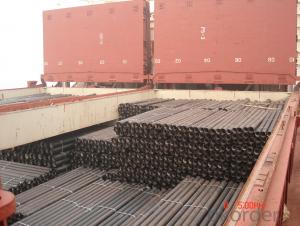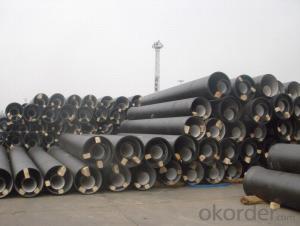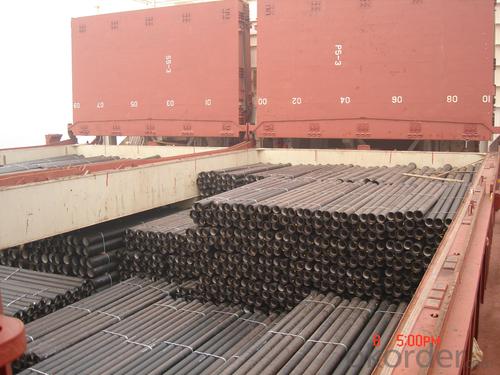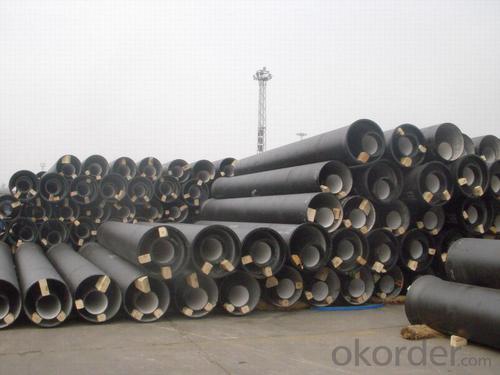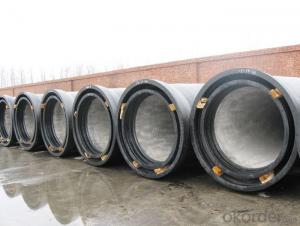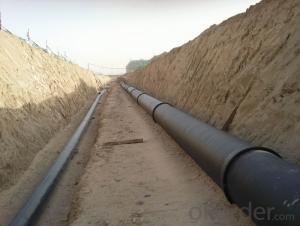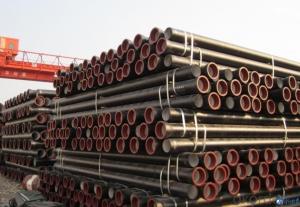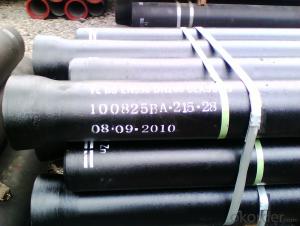Ductile Iron Pipe ISO2531:1998 C CLASS DN800
- Loading Port:
- China main port
- Payment Terms:
- TT or LC
- Min Order Qty:
- 20 m.t.
- Supply Capability:
- 50000 m.t./month
OKorder Service Pledge
OKorder Financial Service
You Might Also Like
1.Ductile Iron Pipe Description :
DI pipe fittings are manufactured according to ISO 2531 or BS EN545 or BS4772 FOR POTABLE WATER ,internal is cement lining or wet epoxy coating;External is zinc plus bitumen or wet epoxy coating. We also manufacture ductile iron fittings with fusion bonded epoxy both inside and outside. All the producets are sutible to water pipes fields.We have passed ISO9001,ISO14001,OHSMS18001 certificate.
2.Main Features of the Ductile Iron Pipe:
1. Material: Ductile iron grade 500-7/ 450-10 in accordance with ISO1083
2. Standard: ISO 2531, EN545, EN598, ANSI, AWWA
3. Certificate: ISO9001, ISO14001, SGS, NSF, WRAS
4. Test: In accordance with ISO 2531 / EN 545 / EN598 and 100% water pressure test
5. Length: 6m or cut into 5.6m, 5.7m, 5.8m
6. Internal Lining: Cement, conform to ISO4179
7. External coating: Zinc + Bitumen, conform to ISO8179
3.Ductile Iron Pipe Images:
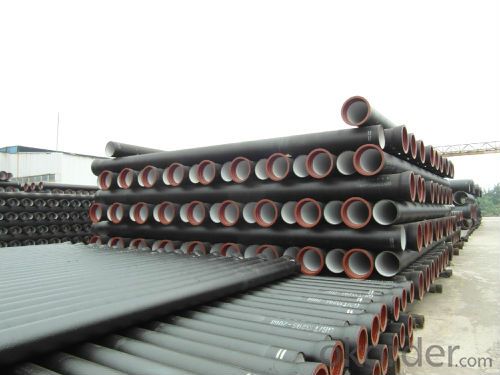
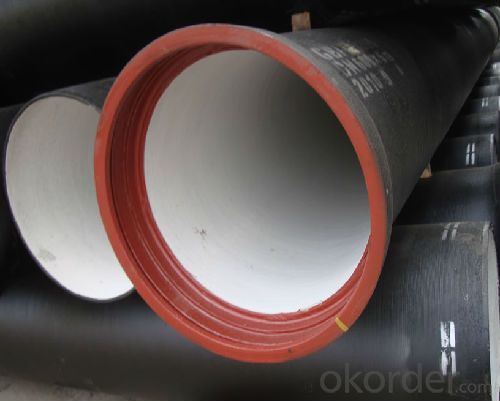
4.Ductile Iron Pipe Specification:
Model Number: DN80-1600
Length: 6M/5.7M/NEGOTIATED
Standard: ISO2531 / EN545
Application: Potable/Sewage Water
Diameter: DN80-1600
Shape: Round
Hardness: 230
Pipe Wall Thickness: standerd
Pull Strength: 420
Yield (≥ MPa): 300
5.FAQ:
We have organized several common questions for our clients,may help you sincerely:
1.Q: Why would you choose ductile iron pipe rather than other pipe materials?
A:The reasons are obvious for that not only ductile iron pipe possesses the inherent strength and flexibility of ductile
iron, combined with proven corrosion protection systems, but also the cost savings can be achieved from design to
installation and commissioning.
2.Q:Why can you guarantee the inner of pipes can’t be corroded?
A: High alumina cement mortar lining and sulphate-resistant cement mortar lining. These two special linings are applicable
to inner anti-corrosion for sewage pipes, improving resistance to erosion of the sewage components.
- Q: Can ductile iron pipe be used for underground fire protection systems?
- Yes, ductile iron pipe can be used for underground fire protection systems. Ductile iron pipe is a durable and reliable material that is commonly used in various applications, including water and wastewater systems, as well as fire protection systems. It has excellent strength, corrosion resistance, and longevity, making it suitable for underground installations. When it comes to fire protection systems, ductile iron pipe can effectively handle high-pressure water flow and withstand extreme conditions, making it an ideal choice for underground installations. It is capable of withstanding the intense heat and pressure that may occur during a fire event. Additionally, ductile iron pipe is available in various sizes and configurations, allowing for flexibility in design and installation. It is also compatible with different types of fittings and accessories, making it easy to connect to other components of the fire protection system. Overall, ductile iron pipe is a reliable and durable choice for underground fire protection systems, providing the necessary strength and longevity to ensure the safety of the premises and its occupants.
- Q: What are the advantages of using ductile iron pipe over concrete pipe?
- There are several advantages of using ductile iron pipe over concrete pipe. Firstly, ductile iron pipe has superior strength and durability, with a higher resistance to cracking and breaking compared to concrete pipe. This makes it ideal for underground applications where it is subjected to heavy loads and pressure. Secondly, ductile iron pipe has a longer service life, typically lasting 50 to 100 years, compared to the 30 to 50-year lifespan of concrete pipe. Additionally, ductile iron pipe is easier to install and maintain, as it is lighter in weight and requires fewer joints. It also offers better flow capacity, reducing head loss and improving overall system efficiency. Lastly, ductile iron pipe is more resistant to corrosion, ensuring long-term reliability and reduced maintenance costs.
- Q: Can ductile iron pipes be used for irrigation of sports fields?
- Indeed, ductile iron pipes are suitable for the irrigation of sports fields. Renowned for their robustness, longevity, and flexibility, these pipes are an excellent choice for a range of applications, including irrigation. With their ability to withstand external pressures and impacts, ductile iron pipes are particularly advantageous for sports fields that encounter heavy foot traffic and potential damage. Moreover, these pipes exhibit exceptional resistance to corrosion, guaranteeing enduring performance and minimal upkeep. The pipes' smooth interior surface also facilitates efficient water flow, preventing obstructions and ensuring adequate irrigation for the sports fields. All in all, ductile iron pipes represent a dependable and appropriate option for irrigation systems in sports fields.
- Q: How are ductile iron pipes protected against internal corrosion caused by chemicals?
- To safeguard against internal corrosion caused by chemicals, ductile iron pipes implement various protective measures. Primarily, these pipes are equipped with either a cement mortar lining or an epoxy coating, creating a barrier between the water or sewage's chemical substances and the iron material. This barrier effectively prevents direct contact, thereby averting corrosion. Additionally, a corrosion-resistant polymer or bituminous coating is frequently applied to the pipes' exterior. This supplementary layer of protection shields the pipes from potential chemical exposure originating externally. Moreover, cathodic protection is a commonly employed technique to counter internal corrosion. Sacrificial anodes, typically composed of zinc or magnesium, are affixed to the pipes. Over time, these anodes undergo corrosion instead of the iron, sacrificing themselves to safeguard the pipes against chemical-induced corrosion. Furthermore, regular maintenance and monitoring play a crucial role in the prevention and rectification of corrosion issues. This entails routine inspections, cleaning, and prompt repair of any corroded or damaged areas. Overall, the integration of lining, external coating, cathodic protection, and maintenance practices ensures the comprehensive protection of ductile iron pipes against internal corrosion caused by chemicals. This prolongs their lifespan and guarantees the integrity of the pipeline system.
- Q: Can ductile iron pipes be used for stormwater drainage?
- Yes, ductile iron pipes can be used for stormwater drainage. Ductile iron pipes are known for their strength and durability, making them suitable for various applications, including stormwater drainage systems. These pipes have high tensile strength and can withstand heavy loads and pressure, making them ideal for carrying large volumes of stormwater. Additionally, ductile iron pipes have a smooth interior surface that reduces friction and allows for efficient flow of water, minimizing the risk of blockages and clogging. With proper installation and maintenance, ductile iron pipes can provide a reliable and long-lasting solution for stormwater drainage.
- Q: Can ductile iron pipes be used in sewage treatment plants?
- Indeed, sewage treatment plants can utilize ductile iron pipes. Given their durability, strength, and resistance to corrosion, ductile iron pipes are frequently employed in sewage systems. They exhibit exceptional resilience against the challenging circumstances commonly encountered in sewage treatment plants, including corrosive wastewater and high-pressure environments. Moreover, ductile iron pipes boast remarkable crack resistance and offer long-term reliability, rendering them an ideal option for sewage treatment plants where a dependable and efficient sewage system is of utmost importance.
- Q: Can ductile iron pipes be used in areas with high soil liquefaction potential?
- No, ductile iron pipes are not recommended for areas with high soil liquefaction potential.
- Q: Are there any specific standards or specifications for ductile iron pipes?
- Yes, there are specific standards and specifications for ductile iron pipes. The most widely recognized standards for ductile iron pipes include ISO 2531, EN 545, and ASTM A536. These standards outline the requirements for the material composition, physical properties, dimensions, and testing methods of ductile iron pipes. Additionally, different countries or regions may have their own specific standards or specifications for ductile iron pipes.
- Q: Do rigid cement cast iron pipes need cement piers?
- Ductile iron pipes mainly called centrifugal ductile iron pipe, it has the properties of nature, iron and steel, excellent corrosion resistance, good ductility, good sealing effect, simple installation, mainly for municipal, industrial and mining enterprises, water supply, gas, oil etc.. Water supply pipe is the first choice, with high cost performance. Compared with the PE pipe, from the installation time, ductile pipe PE pipe installation is simple and rapid, and after the installation of internal and external pressure bearing better tightness and corrosion resistance; from the point of view, ductile pipe sealing better after installation, but also can improve the corrosion resistance of corrosion protection through a variety of means; from the hydraulic performance, because ductile pipe specifications generally refers to the inner diameter of PE pipe diameter specifications generally refers to the same specifications, because under the condition of ductile pipe can achieve greater runoff; from the installation and maintenance cost, ductile pipe have more favorable price. The main components of ductile iron pipes are carbon, silicon, manganese, sulfur, phosphorus and magnesium. The inner wall of zinc spray, anti-corrosion materials such as cement mortar.
- Q: Can ductile iron pipes be used for underground river crossings?
- Underground river crossings can indeed utilize ductile iron pipes. Renowned for their robustness and longevity, ductile iron pipes are highly versatile, making them ideal for a range of applications, including underground river crossings. These pipes possess exceptional tensile strength, enabling them to withstand the external forces and pressures imposed by the surrounding soil and water. Moreover, their outstanding resistance to corrosion is paramount when dealing with subterranean water sources like rivers. Additionally, ductile iron pipes can endure ground movements, settling, and any geological obstacles that may arise during the installation and operation of underground river crossings. Consequently, they represent a dependable choice, ensuring the secure and efficient conveyance of water across rivers while preserving the integrity of the subterranean infrastructure.
Send your message to us
Ductile Iron Pipe ISO2531:1998 C CLASS DN800
- Loading Port:
- China main port
- Payment Terms:
- TT or LC
- Min Order Qty:
- 20 m.t.
- Supply Capability:
- 50000 m.t./month
OKorder Service Pledge
OKorder Financial Service
Similar products
Hot products
Hot Searches
Related keywords
